Overview
The article titled “10 Strategies for Effective Pharmaceutical Marketing Insights” emphasizes the identification of key strategies that significantly enhance the effectiveness of pharmaceutical marketing. It underscores the critical role of data-driven methodologies, particularly through CareSet’s comprehensive analysis of Medicare claims. This approach not only refines marketing strategies but also improves engagement with healthcare professionals and patients. Such targeted efforts ensure that campaigns are meticulously tailored to meet the specific needs of the audience, ultimately driving better outcomes in the pharmaceutical sector.
Introduction
In the rapidly evolving landscape of pharmaceutical marketing, companies encounter the formidable challenge of navigating complex data and regulatory environments while striving to connect effectively with healthcare professionals and patients.
The integration of advanced data analytics and innovative marketing strategies positions organizations like CareSet at the forefront of utilizing Medicare insights to enhance their outreach efforts.
By leveraging comprehensive data sets, pharmaceutical marketers can develop targeted campaigns that resonate with their audience, ultimately improving patient outcomes and driving business success.
As the industry transitions towards a more data-driven approach, grasping the nuances of patient behavior and market trends is essential for maintaining a competitive edge in this dynamic field.
CareSet: Comprehensive Medicare Data Insights for Targeted Marketing
CareSet excels in extracting and interpreting complex Medicare claims data, offering stakeholders invaluable insights into treatment patterns, provider networks, and demographics. By examining over $1.1 trillion in yearly claims data, CareSet enables drug companies to identify new healthcare provider targets and refine their strategies for pharmaceutical marketing based on empirical evidence. This data-driven methodology significantly enhances the precision of pharmaceutical marketing initiatives, ensuring that campaigns effectively engage the intended audience and improve patient outcomes. A compelling case study on the oncology treatment Qinlock illustrates how CareSet’s insights empower healthcare providers to engage meaningfully regarding late-stage therapy options for rare conditions like Gastrointestinal Stromal Tumor (GIST).
Furthermore, CareSet Systems has launched innovative data science products designed to aid drug launches, reinforcing its commitment to enhancing healthcare insights. This comprehensive approach not only meets urgent data requirements but also encourages long-term strategic development for healthcare partners, making its insights essential for navigating the competitive environment of pharmaceutical marketing. As Cole Zanetti, the acting director for value-based care in the VHA’s Center for Care and Payment Innovation, noted, “Part of the reason why I came to the VA from the private sector… is that I thought that the VA can serve as a beacon of what care and payment models should be for CMS and the private sector.” This viewpoint underscores the significance of innovative data analysis in shaping effective promotional strategies for pharmaceutical marketing.
Acxiom: Omnichannel Engagement Solutions for Healthcare Professionals
CareSet offers comprehensive Medicare data solutions that empower drug marketers to engage effectively with healthcare professionals (HCPs) across diverse touchpoints. By harnessing insights from over 62 million beneficiaries and 6 million providers, CareSet enables the creation of unified customer profiles, which are vital for delivering personalized messaging. This tailored strategy significantly boosts the effectiveness of marketing campaigns and fortifies relationships between pharmaceutical brands and HCPs.
Furthermore, CareSet’s insights are crucial in shaping equitable compensation from payers and fostering payer collaborations, which are essential for successful engagement approaches. Enhanced connections lead to improved outcomes for individuals, aligning with the latest trends in healthcare professional engagement strategies.
Industry leaders stress that personalized messaging is indispensable for maximizing engagement and ensuring communications resonate with HCPs. As Sara Vaezy articulates, “It’s less about adapting to the pandemic and more about leveraging our learnings to further the health system’s mission to serve all individuals in a more effective, scalable and equitable way,” underscoring the significance of leveraging insights for effective engagement.
To discover how CareSet’s extensive healthcare data insights can empower your business for data-driven success, connect with us today.
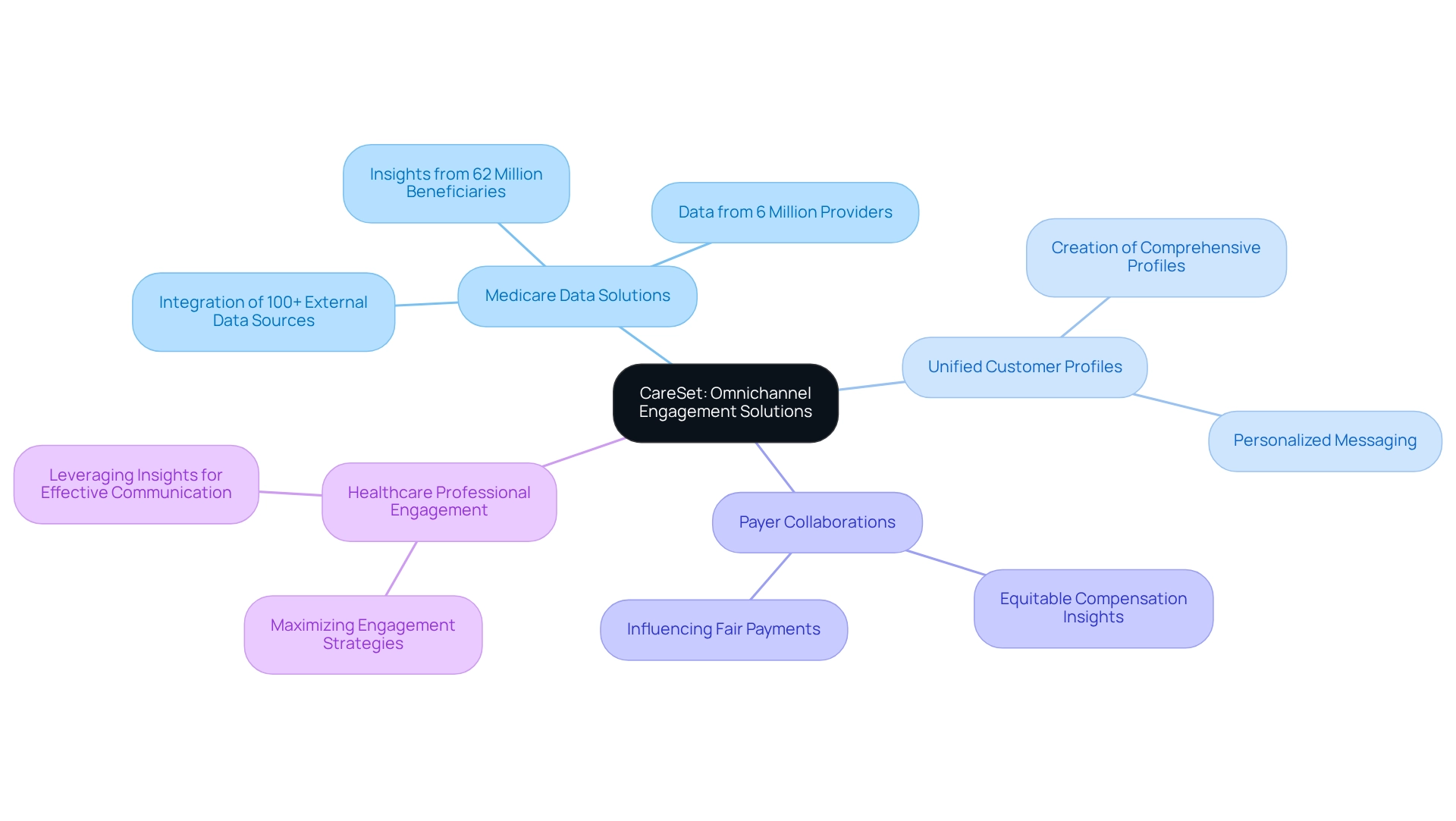
Fierce Pharma: Insights on Patient Behavior and Market Trends
Fierce Pharma delivers essential insights into consumer behavior and emerging market trends, equipping pharmaceutical companies with the necessary knowledge to navigate the complexities of the healthcare landscape. By leveraging extensive Medicare data insights from CareSet, marketers can develop targeted campaigns that resonate with individual needs, ultimately enabling data-driven success in healthcare. This data-centric approach not only boosts engagement but also significantly enhances the efficiency of promotional strategies, ensuring alignment with current market dynamics.
Recent statistics reveal that shared analytics dashboards, accessible to both individuals and providers, can elevate overall individual-provider satisfaction by 31%. Such insights underscore the importance of comprehending consumer preferences in shaping effective marketing strategies.
A compelling case study exemplifies this point: a global pharmaceutical company harnessed engagement analytics to improve retention in a Phase III clinical trial for a diabetes medication. By pinpointing early warning signs of potential dropouts through engagement patterns with the trial’s mobile application, the company enhanced retention rates from 76% to 92%, increased protocol adherence by 34%, and completed the trial seven weeks ahead of schedule—all while enhancing data quality metrics by 29%.
As James Merlino, Chief Clinical Transformation Officer at Cleveland Clinic, asserts, “In today’s competitive healthcare landscape, concentrating on client experience is essential for organizational success.” This perspective emphasizes the critical nature of aligning marketing strategies with consumer preferences. Expert insights affirm that understanding consumer behavior trends is not merely beneficial but vital for organizational success in the current competitive healthcare environment. Furthermore, the most significant advantage of digital transformation in the medical sector is the improvement of patient outcomes through the expedited delivery of better drugs and treatments, highlighting the pivotal role of digital tools in enhancing patient engagement.
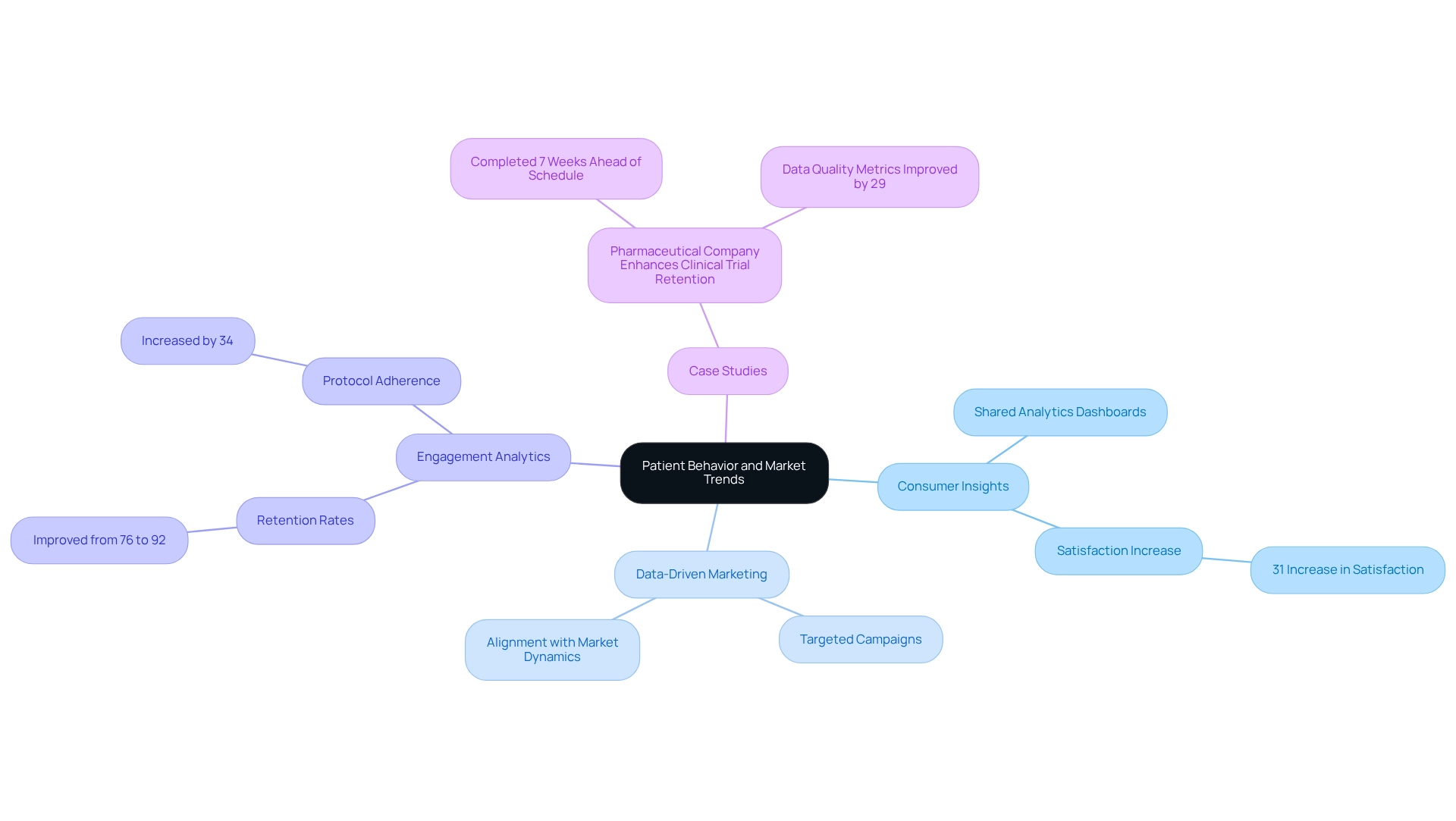
Marketing Blatt: Effective Strategies for Digital Transformation in Pharma
The significance of digital transformation in pharmaceutical marketing is paramount. As the pharmaceutical marketing industry increasingly embraces digital-focused strategies, companies are compelled to leverage innovative technologies for effective audience engagement. This evolution in pharmaceutical marketing encompasses a variety of digital tools, including social media, email marketing, and targeted online advertising, which are essential for reaching both healthcare professionals and individuals in need of care. By adopting these online methodologies, pharmaceutical marketing can significantly enhance drug marketers’ outreach initiatives and improve the overall patient experience.
Recent trends reveal that over half of finance leaders in the pharmaceutical marketing sector are prioritizing digital investments, particularly in advanced data analytics and artificial intelligence, to standardize and automate processes. This shift, as underscored in the case study on digital transformation in pharma, not only streamlines operations but also cultivates innovation in pharmaceutical marketing, enabling companies to develop new business models that align with contemporary healthcare dynamics.
On October 19, 2016, CareSet Systems unveiled four new dynamic data science products aimed at refining drug launch strategies and delivering comprehensive Medicare data insights. These solutions enable biotech firms to make data-informed decisions that enhance health outcomes and optimize lifecycle management.
Social media plays a pivotal role in user engagement. Successful examples of pharmaceutical marketing by companies utilizing platforms like Twitter and LinkedIn illustrate how targeted content can facilitate meaningful interactions with healthcare professionals, ultimately leading to improved patient outcomes. For instance, organizations that effectively engage on social media have reported increased trust and enhanced decision-making among healthcare providers. Moreover, effective digital strategies that involve healthcare professionals are crucial for pharmaceutical marketing, as they help build trust and enable informed decision-making.
As Tajammul Pangarkar, CMO at Prudour Pvt Ltd, articulates, “Digital transformation is not just about technology; it’s about creating a culture that embraces change and innovation.” This perspective emphasizes the necessity for pharmaceutical companies to consistently adapt their approaches to fully leverage the capabilities of digital tools, including the actionable insights provided by CareSet’s Medicare data solutions.
Looking ahead to 2025, the focus on digital transformation in pharmaceutical marketing is set to intensify. Companies must remain agile, continuously refining their strategies to harness the complete potential of digital tools and data insights. By doing so, they can not only address the evolving needs of their audiences but also position themselves as leaders in the competitive medical landscape.
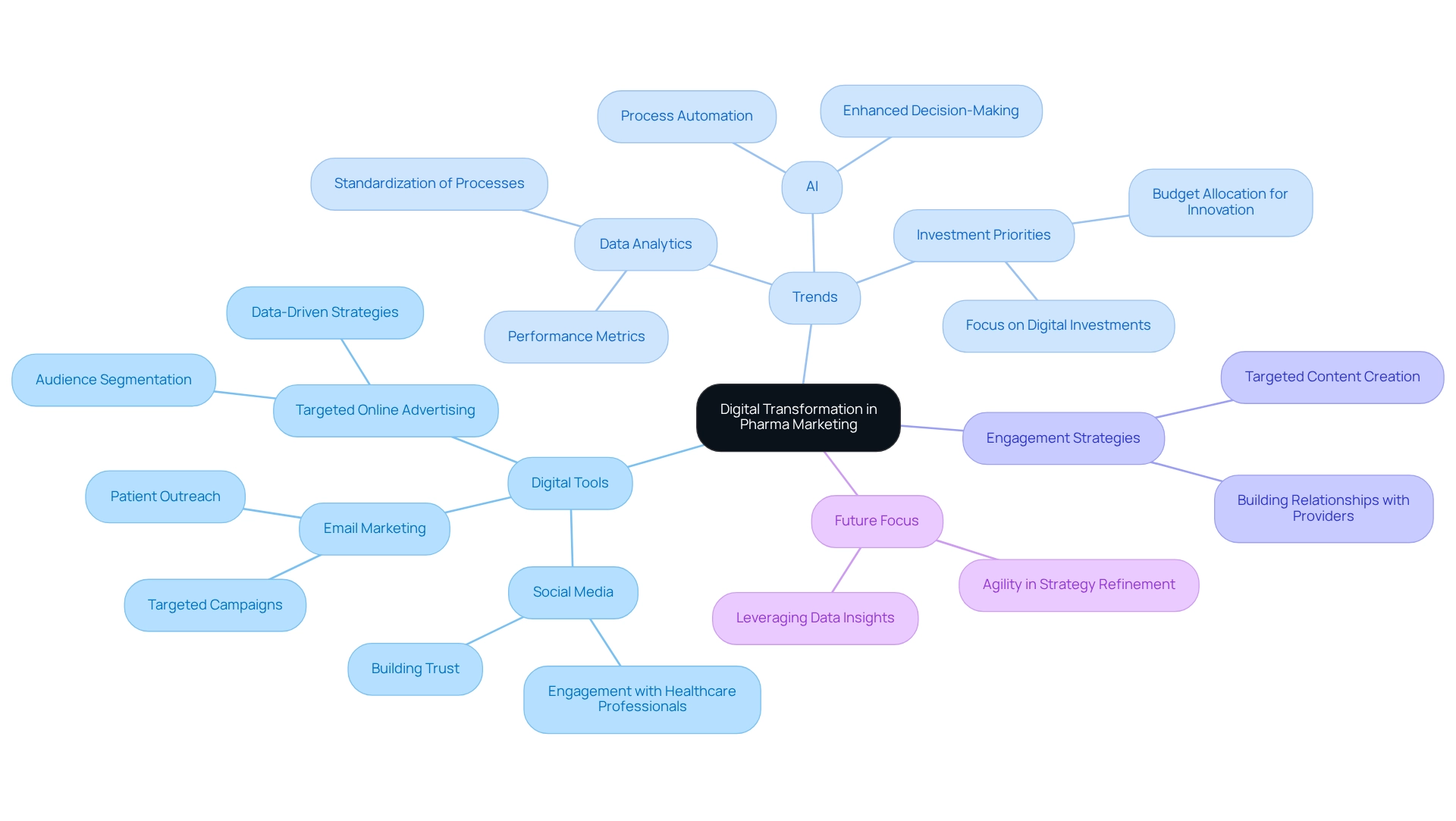
Chief Outsiders: Fractional CMO Services for Strategic Marketing
Chief Outsiders provides fractional CMO services that empower drug companies with strategic leadership in promotion, eliminating the long-term commitment associated with full-time employees. This innovative model allows organizations to leverage the expertise of seasoned professionals who can refine strategies, optimize campaigns, and drive sustainable growth. By employing fractional CMOs, drug companies can significantly enhance their effectiveness in pharmaceutical marketing while enjoying operational flexibility.
The advantages of this approach are underscored by a report from DemandMetric, revealing that firms utilizing fractional CMOs achieve an average of 48% faster time-to-market for new products and services. This translates into quicker returns on investment, a crucial factor in today’s rapidly evolving medical landscape where the demand for virtual and decentralized trials is on the rise, reflecting shifting consumer preferences. Fractional CMOs assist businesses in adapting to these trends by implementing customized marketing strategies that align with current market dynamics. Furthermore, they bring a wealth of experience and insights that can help companies navigate complex market challenges.
CareSet’s comprehensive healthcare data insights empower pharmaceutical and biotech companies to enhance their engagement with healthcare providers. For example, a case study focusing on oncology treatment options illustrated how strategic partnerships, such as the collaboration between Greenville Memorial Medical Center and Visante, can improve operational efficiency and patient safety. This aligns seamlessly with the advantages that fractional CMOs offer in optimizing promotional campaigns.
As the industry continues to evolve, the strategic guidance provided by fractional CMOs, coupled with CareSet’s data leadership, becomes increasingly invaluable, ensuring that companies remain competitive and responsive to market demands. To explore how CareSet can bolster your promotional efforts, consider reaching out to learn more about our services.
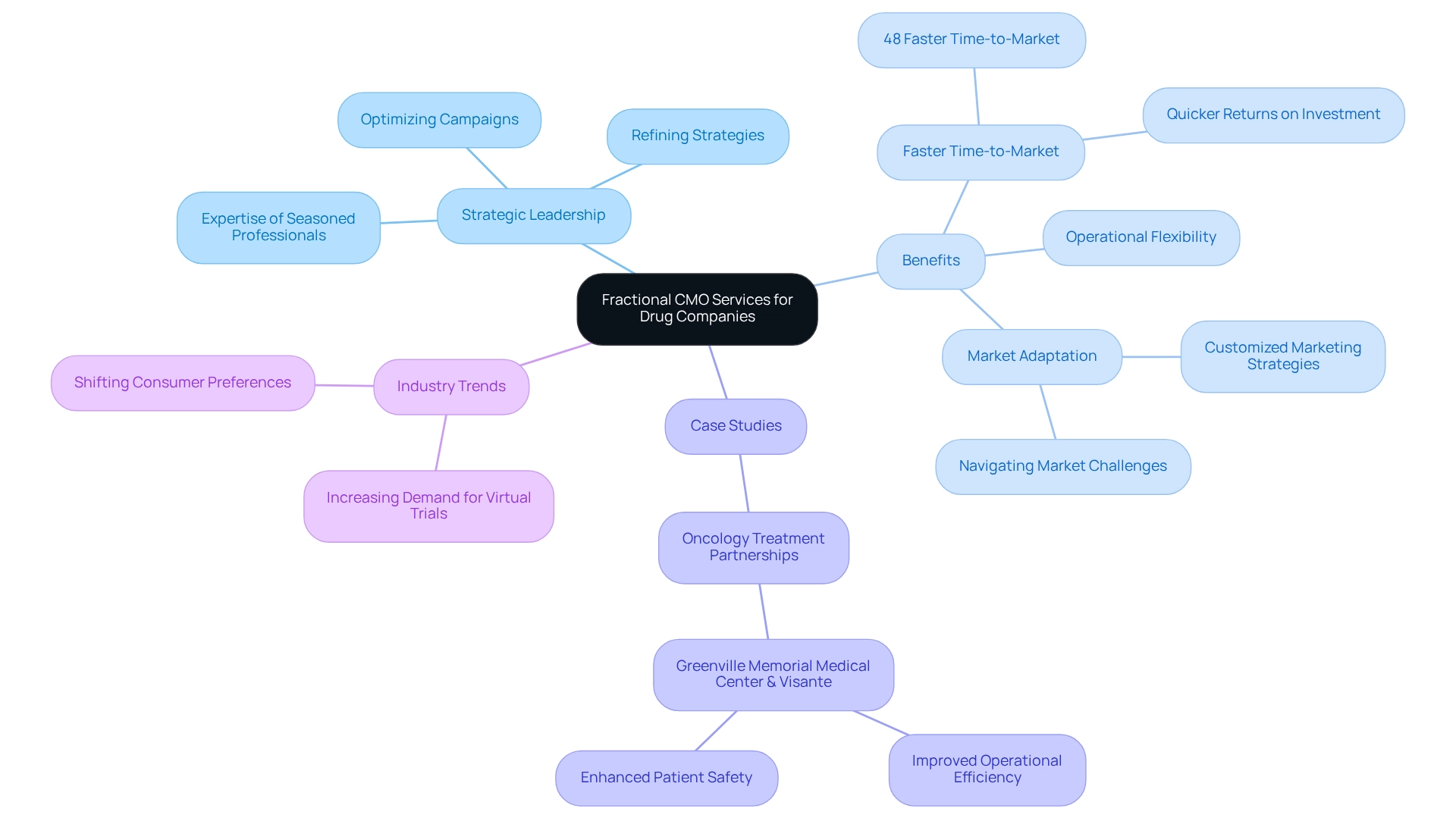
MMM Online: Leveraging Memory Science in Pharmaceutical Marketing
The integration of memory science in pharmaceutical marketing is increasingly recognized as pharmaceutical companies realize the critical influence cognitive processes have on message retention. By tailoring promotional messages to align with the brain’s information processing, these companies can significantly enhance the effectiveness of their campaigns. This strategic approach to pharmaceutical marketing not only elevates brand recall but also fosters stronger relationships with healthcare professionals and patients, ultimately leading to improved engagement and adherence to treatment plans.
Recent research underscores that effective messaging can yield a substantial increase in retention rates. Studies indicate that well-crafted campaigns can enhance recall by as much as 50%. Additionally, CareSet Systems leverages over 100 external data sources for its analysis, providing a robust foundation for enhancing promotional effectiveness through data integration. Announced on October 19, 2016, CareSet’s innovative data science products empower pharmaceutical and biotech companies to utilize comprehensive Medicare data solutions, enabling informed decision-making throughout the pharmaceutical lifecycle. These products include advanced analytics tools, real-time data integration, and customizable reporting features that bolster promotional initiatives. Successful campaigns that apply memory science principles have shown improved patient engagement, as evidenced by case studies like Feedtrail’s Patient Experience Enhancement, where organizations employed real-time feedback platforms to refine their messaging strategies.
Furthermore, insights from cognitive researchers suggest that incorporating elements such as storytelling and emotional resonance into promotional materials can further enhance retention. By grasping the intricacies of cognitive processing, drug marketers can craft campaigns that resonate more profoundly with their audience, ensuring that essential information is not only conveyed but also retained.
As Charles Darwin famously stated, “It is not the strongest of the species that survives, nor the most intelligent, but the one most responsive to change.” As the healthcare landscape evolves in 2025, integrating memory science into promotional strategies, supported by CareSet’s data-driven insights, will be essential for firms aiming to stand out in a competitive market. By focusing on how cognitive processes affect message retention, pharmaceutical marketing teams can design campaigns that not only inform but also inspire action, ultimately leading to improved patient outcomes and heightened market success.
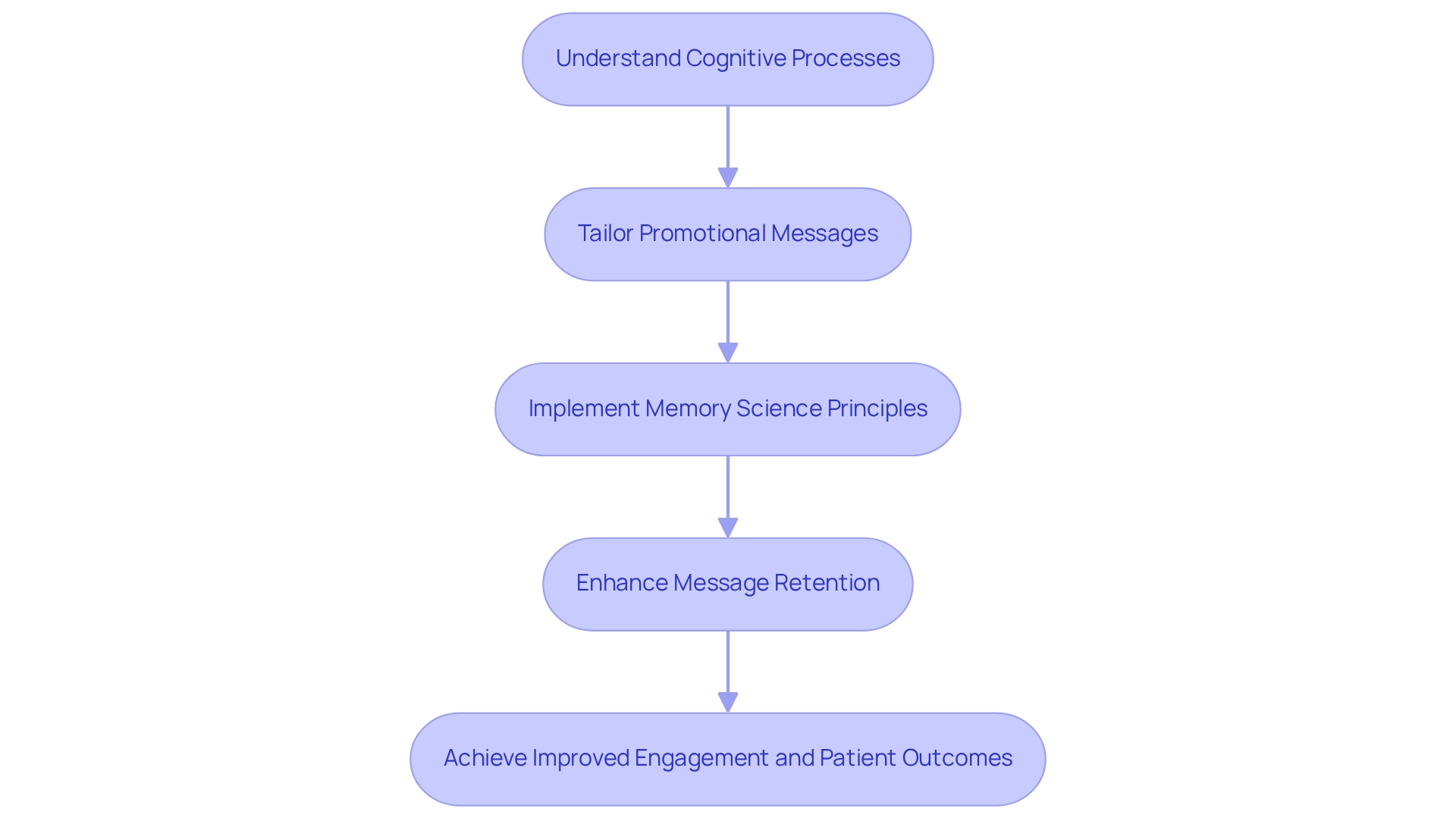
Biopharma Dive: Commercialization Strategies and Regulatory Insights
In the evolving landscape of pharmaceutical marketing, understanding the regulatory environment is paramount. As scrutiny from regulators intensifies, companies must navigate a complex compliance landscape to ensure their promotional strategies are both effective and compliant. Aligning promotional efforts with regulatory requirements in pharmaceutical marketing not only mitigates risks but also enhances initiatives for market access. This strategic alignment is crucial for developing campaigns in pharmaceutical marketing that resonate with stakeholders while adhering to industry standards.
Current regulatory challenges necessitate a proactive approach. A significant 62% of compliance officers dedicate between 1 to 7 hours weekly to track regulatory developments, underscoring the time-intensive nature of maintaining compliance. Furthermore, two-thirds of compliance experts recognize the importance of integrating Environmental, Social, and Governance (ESG) factors into their decision-making processes, reflecting a broader trend toward responsible promotional practices.
Commercialization approaches for medications in 2025 must emphasize regulatory insights to ensure adherence. Successful cases illustrate that aligning pharmaceutical marketing with regulatory frameworks can lead to improved outcomes. CareSet’s comprehensive Medicare data analysis capabilities, encompassing over $900 billion in annual claims and 14+ years of claims data, empower drug companies to navigate these complexities effectively. This analysis provides insights from over 62 million beneficiaries and 6 million providers, ensuring that promotional strategies are guided by precise and timely information, ultimately enhancing care for individuals and facilitating market entry.
As the biologics sector is projected to expand at a compound annual growth rate of 15% until 2027, drug companies must seize this growth by adopting effective commercialization plans. Regulatory specialists indicate that enhancing third-party risk management procedures is a primary focus for 40% of legal, compliance, and privacy leaders, highlighting the essential need for robust compliance frameworks in pharmaceutical marketing efforts.
In conclusion, the convergence of regulatory adherence and promotional strategy is vital for companies in the pharmaceutical industry aiming to thrive in a competitive environment. By prioritizing adherence and synchronizing marketing efforts with regulatory insights, companies can strengthen their market access strategies and ultimately improve patient outcomes.
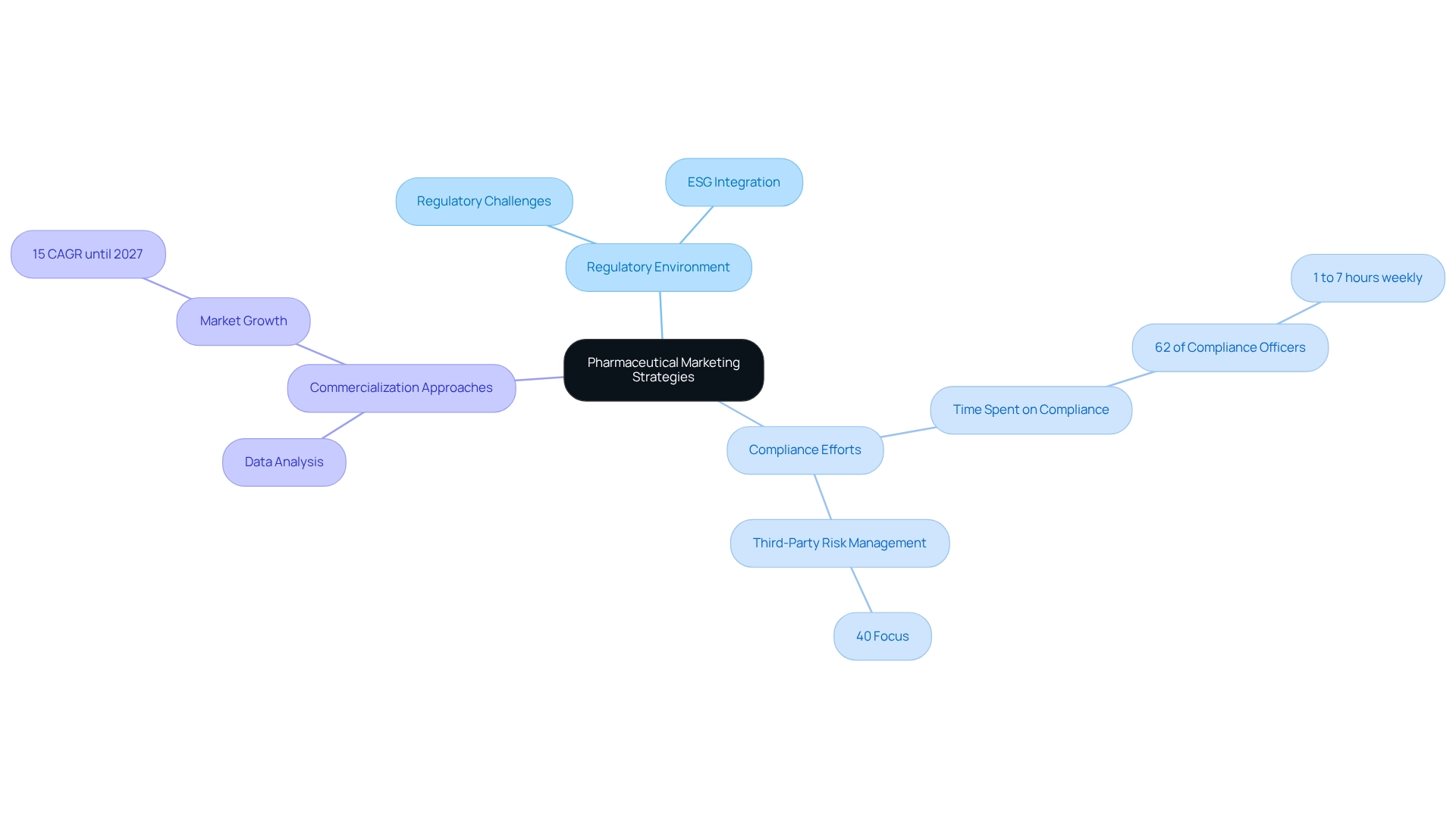
Llamaleadgen: Lead Generation Strategies for Pharmaceutical Marketing
Llamaleadgen highlights innovative lead creation approaches specifically tailored for the healthcare industry. By harnessing data-driven methodologies and targeted outreach, pharmaceutical marketing can effectively identify and engage potential clients. CareSet’s comprehensive method for Medicare data analysis, which includes insights from over 62 million beneficiaries and 6 million providers, plays a vital role in enhancing these plans. This allows companies to leverage insights that elevate their promotional efforts.
Key digital strategies, such as content creation and social media campaigns, are essential for attracting healthcare professionals and patients alike. Notably, statistics reveal that 33.2% of marketers in pharmaceutical marketing employ live chat to increase conversions, underscoring the effectiveness of interactive engagement techniques guided by CareSet’s data insights. A well-organized lead generation approach within pharmaceutical marketing not only expands market reach but also significantly enhances the overall impact of promotional initiatives.
As the landscape evolves, the demand for trustworthy and accurate content becomes paramount. A recent study indicated that 87% of participants expressed concerns about medical misinformation, highlighting the critical role of credible information in building consumer confidence. CareSet’s commitment to providing precise and thorough Medicare insights highlights the importance of reliable information in the realm of pharmaceutical marketing.
By focusing on these innovative strategies, pharmaceutical marketing can ensure that drug marketers’ outreach is both effective and aligned with the needs of 2025 and beyond. Furthermore, as highlighted by Campaign Monitor, promotional emails yield better results when sent on a Monday, Tuesday, or Wednesday, providing additional insight into effective outreach techniques.
Emerald Group Publishing: Research Insights for Pharmaceutical Marketing
Emerald Group Publishing provides crucial research insights that can substantially enhance marketing strategies within the healthcare sector. By leveraging an extensive array of academic and industry research, drug companies can attain a nuanced understanding of market trends and patient behaviors. This knowledge empowers marketers to craft data-driven campaigns that resonate with their target audiences, ultimately enhancing engagement and outcomes.
Recent trends reveal that specialty drugs are increasingly dominating the pharmaceutical landscape, with growth rates outpacing those of traditional medications. Industry experts note, “specialty drugs continue to dominate the landscape, with significant growth outpacing traditional medications.” This observation underscores the importance of grasping market dynamics, making the incorporation of over 100 external data sources essential for developing effective promotional strategies. Such a comprehensive approach not only informs campaign development but also fosters long-term strategic growth for healthcare partners.
Successful applications of academic research in promotional strategies highlight its effectiveness. For instance, CareSet’s case study on an oncology treatment manufacturer illustrates how unlocking Medicare data can empower healthcare providers to engage meaningfully regarding treatment options like Qinlock for Gastrointestinal Stromal Tumor (GIST). This data-focused methodology is vital for drug firms aiming to elevate their promotional strategies and enhance health outcomes.
Current research trends emphasize the necessity for pharmaceutical marketing to stay attuned to evolving consumer needs and market dynamics. Expert insights suggest that understanding these elements is crucial for steering marketing strategies to meet consumer expectations. As political discussions surrounding drug pricing intensify, it is imperative for marketers to adapt their strategies based on research insights, as these discussions may significantly influence corporate plans. CareSet’s comprehensive Medicare data solutions provide essential insights into individual needs, provider networks, and medication usage, enabling marketers to adeptly navigate the complexities of the healthcare environment.
Data Revolt Agency: Content Marketing Strategies for Healthcare and Pharma
Effective pharmaceutical marketing strategies are essential for healthcare and drug companies that aim to enhance brand visibility and credibility. By creating high-quality, informative material that addresses the specific needs and concerns of healthcare professionals and individuals, these companies can significantly enhance engagement and adherence to treatment regimens. Data show that 76% of individuals have interacted with online videos regarding health symptoms and treatments, highlighting the significance of digital resources in educating individuals.
Current trends suggest that user experience is becoming more impactful in doctor choice, making it essential for drug companies to focus on content that connects with their audience. For instance, companies that maintain a blog generate 67% more sales leads, demonstrating the effectiveness of consistent, informative content in driving engagement. This statistic underscores the need for drug companies to invest in pharmaceutical marketing strategies that not only educate potential clients and healthcare professionals but also engage them effectively. CareSet’s monthly Medicare updates offer innovative insights into drug usage and treatment pathways, addressing critical questions such as which diseases providers diagnose and manage, how individuals transition from diagnosis to treatment, and what therapies Medicare Part D Plans endorse. By charting the individual’s journey from diagnosis to treatment, CareSet enables drug companies to efficiently customize their pharmaceutical marketing strategies. A notable case study illustrates how automated communications can significantly enhance patient adherence to care plans, showcasing the potential of strategic content marketing to motivate patients to take beneficial actions.
As we move into 2025, the focus on high-quality content will be paramount. Experts emphasize that building trust and credibility in pharmaceutical marketing hinges on delivering valuable insights that empower healthcare professionals. Gartner observes that by 2022, over 10% of customer engagement hub architectures will feature real-time event streaming or streaming analytics, signifying a transition towards more dynamic content approaches. By leveraging effective content marketing strategies, including CareSet’s comprehensive Medicare data insights, which identify 15% more targets and 250% more patients than leading claims vendors, companies can foster long-term relationships with their audiences, ultimately leading to improved patient outcomes and optimized market access.
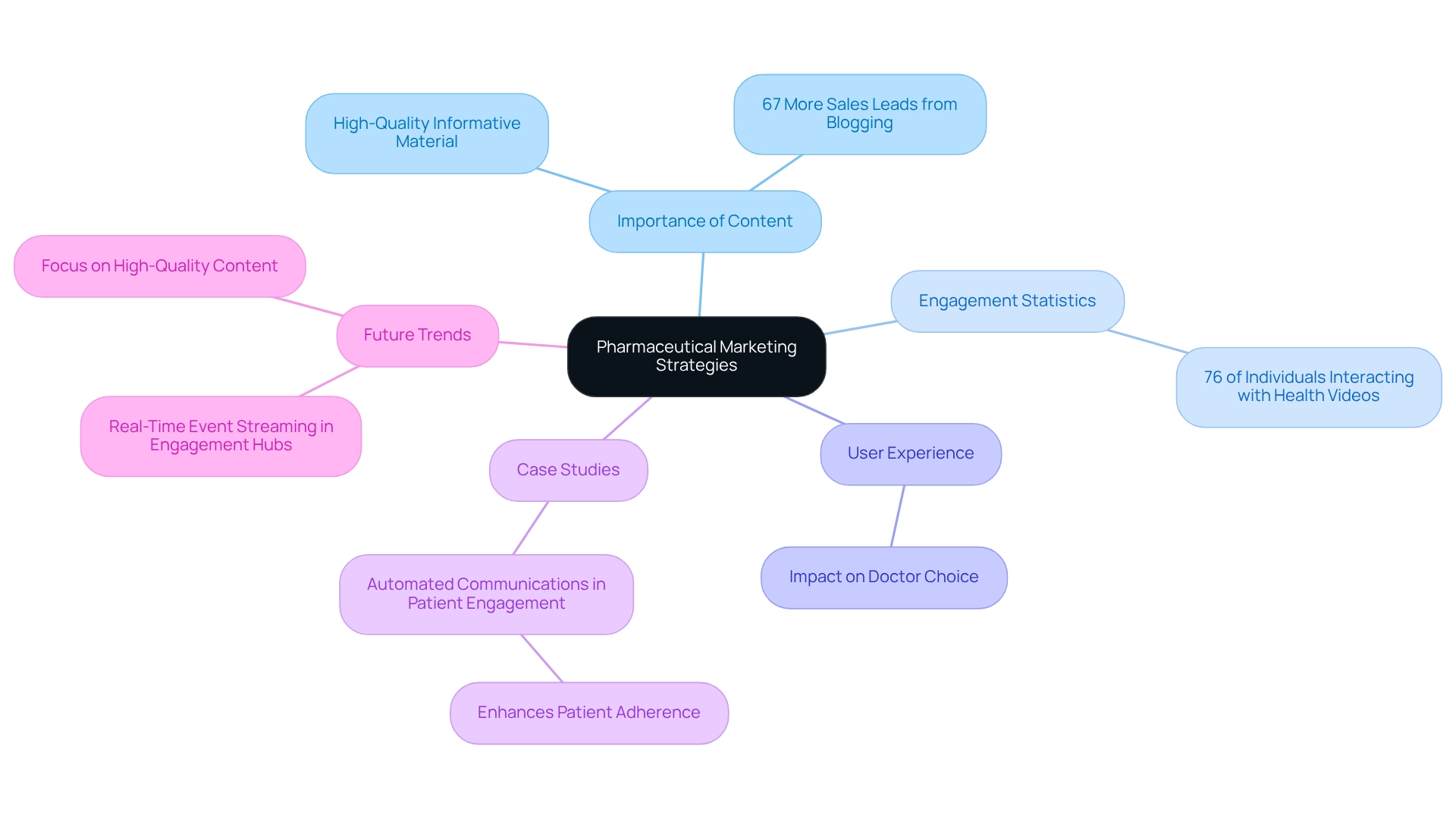
Conclusion
Navigating the complexities of pharmaceutical marketing in today’s data-driven environment is paramount for success. The integration of advanced data analytics, particularly through platforms like CareSet, empowers pharmaceutical companies to derive actionable insights from comprehensive Medicare data. By understanding treatment patterns, patient demographics, and provider networks, organizations can craft targeted campaigns that resonate with both healthcare professionals and patients, ultimately enhancing engagement and improving patient outcomes.
The significance of personalizing marketing strategies cannot be overstated. Engaging healthcare professionals through tailored messaging not only strengthens relationships but also fosters trust—essential elements in today’s competitive landscape. Furthermore, harnessing digital transformation and innovative technologies enables companies to refine their outreach efforts, ensuring that their marketing initiatives are both effective and compliant with regulatory standards.
As the industry continues to evolve, the focus on understanding patient behavior and market trends will be crucial for maintaining a competitive edge. Companies that adapt their strategies based on data insights and emerging trends will enhance their marketing effectiveness and contribute to improved patient experiences and outcomes. The journey toward a more data-centric approach in pharmaceutical marketing holds great promise, paving the way for a future where informed decisions lead to better healthcare solutions.


